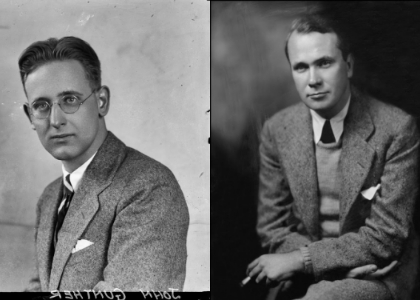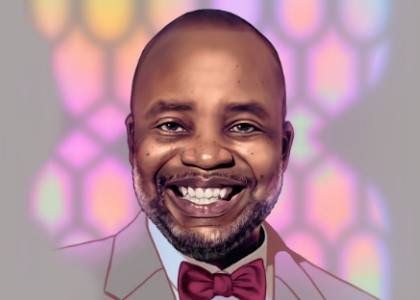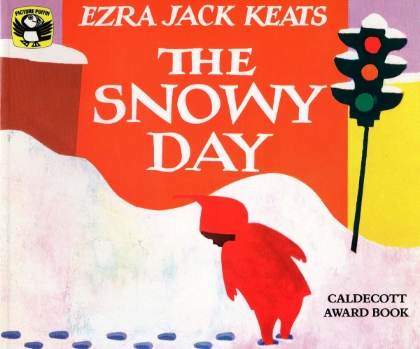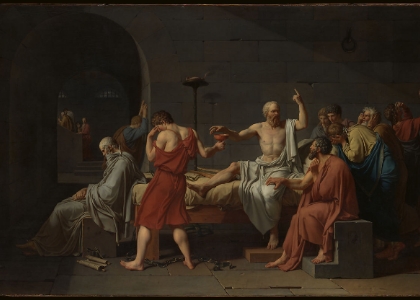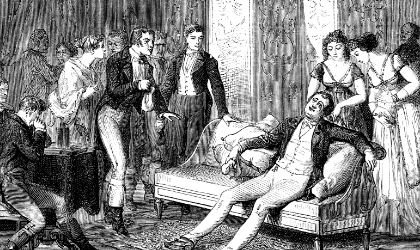|
|
|
|
|
|
|
|
|
|
|
|
| The Maroon alumni who tried to warn the world about Hitler |
|
| |
|
| One day, Hitler vowed, he would return to the Hotel Imperial. As a young man, he had shoveled snow in front of the grand Vienna hotel, doffing his cap respectfully at the Habsburgs, who ignored him. Underneath his obeisance was rage. |
|
| |
|
| In the spring of 1938, after the German army marched into Austria, that day finally came. Hitler set up his headquarters in a first-floor suite—one floor up from the café that had been a favorite hangout of the era’s foreign correspondents. |
|
| |
|
| That sharp shift of events inspired the title of Last Call at the Hotel Imperial: The Reporters Who Took On a World at War (Random House, 2022), a new book by historian Deborah Cohen. Last Call is a group biography of a small circle of foreign correspondents that included two alumni of the (then) Daily Maroon: Vincent Sheean, EX 1921, and John Gunther, PhB 1922. |
|
| |
|
|
|
| Foreign correspondents John Gunther, PhB 1922, in 1926, and Vincent Sheean, EX 1921, in 1934. |
|
| |
|
| All household names in their day, these urbane foreign correspondents were friends and rivals. They drank heavily, threw raucous parties, had tumultuous marriages and affairs, and wrote brutally frank letters and diaries. |
|
| |
|
| Middle-class Americans from provincial backgrounds, they understood what ordinary Americans wanted to know, says Cohen. They also understood—and tried to convey to their readers—what the rise of dictators across Europe meant. War was inevitable, they all agreed; it was only a question of when. |
|
| |
|
|
|
|
|
Structured interview:
D. Maurice Charles |
|
| |
|
| Every issue of the University of Chicago Magazine concludes with “The UChicagoan,” a Q&A with a notable alum or faculty member, using a standard list of questions. Here’s what D. Maurice Charles, MDiv’90, PhD’13, dean of Rockefeller Memorial Chapel, had to say. |
|
| |
|
|
|
| What do you hate that everyone else loves? |
|
|
|
|
| What do you love that everyone else hates? |
|
|
| Snakes. Four serpentine companion animals got me through long hours of dissertation writing. |
|
| |
|
| What book changed your life? |
|
|
| Ezra Jack Keats’s The Snowy Day was the earliest of the life changers. Reading it still gives me the freedom to immerse myself in wonder. |
|
| |
|
|
|
| What’s your least useful talent? |
|
|
| Playing the air organ in my office while [University organist] Tom Weisflog, SM’69, is rehearsing. |
|
| |
|
| What is the worst advice you’ve ever received? |
|
|
| “Don’t go to school there; they never let Black people graduate.” |
|
| |
|
|
|
|
|
| When Socrates trolled Athens |
|
| |
|
|
|
| “Something people often fail to appreciate about Socrates is, yes, he was killed for doing philosophy, but before that happened, he spent a long time doing philosophy and not getting killed for it. And that’s pretty amazing. |
|
| |
|
| “He would walk up to people—often the most powerful and influential people in his society—and he would find a way to ask them: Do you actually know what you are doing? Hey Euthyphro, I know you’re a priest, but do you actually know anything about what the gods want? Hey Laches and Nicias, I know you guys are generals, but can you explain courage? Hey Alcibiades, I know you want to rule the world, but are you sure you wouldn’t be better off enslaved to someone wiser than yourself? Hey Gorgias, I know you’re supposed to be a professional orator, but are you even able to tell me what oratory is? Or what, cat got your tongue, Gorgias? Are you unable to talk about talking? |
|
| |
|
| “It goes on and on like this, dialogue after dialogue. Sometimes it’s hard to avoid the impression that Socrates was trolling Athens. He calls himself a gadfly; he gets called a stinging fish; it’s tempting to compare him to an animal because there never was and never has been another human quite like him. |
|
| |
|
| “He was an incredibly persuasive person—so persuasive that many Athenians let him take a battle-ax to their lives, let themselves be split wide open so that, together, they could take a good hard look at what they saw. The result was more questions than answers; the result was the entire discipline of philosophy.” |
|
| |
|
|
|
|
|
|
|
|
|
| Dean John W. Boyer, AM’69, PhD’75, in 1987. |
|
| |
|
| Alumni: When John W. Boyer, AM’69, PhD’75, the Martin A. Ryerson Distinguished Service Professor of History, was appointed dean of the College in 1992, could he have had any notion that he would become its longest-serving dean? Over three decades, Boyer has transformed the College: updating the Core curriculum, doubling enrollment, establishing the Odyssey Scholarship Program, developing UChicago’s unique Civilization Abroad programs, and more. |
|
| |
|
| He has also inspired, and cheerfully endured, decades of affectionate student jokes, tributes, and hijinks. Met by a flash mob outside Harper in 2016, he raised his hands in the air and danced along. |
|
| |
|
|
|
|
|
|
|
| Previously in College Review |
|
| |
|
|
|
|
|
|
|
|
|
|
|
| The College Review, edited by Carrie Golus, AB’91, AM’93, is brought to you by Alumni Relations and Development and the College. Image credits: DN-0080461, Chicago Sun-Times/Chicago Daily News collection, Chicago Historical Society; Ben Pinchot [Vanity Fair, 1934], Condé Nast Collection/Artstor; Charles Chaisson; The Met; UChicago Photographic Archive, apf1-11920; iStock/ilbusca. |
|
| |
|
|
|
|
|
